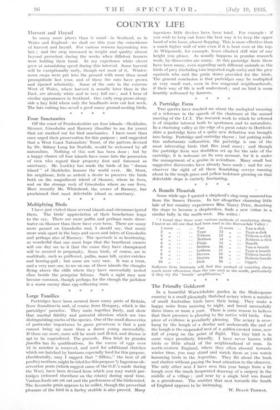Large Families Partridges have been secured from many parts of
Britain, from Scandinavia and,_ of course from Hungary, which is the partridges' paradise. They mate together freely, and show that marital fidelity and parental altruism which are two distinguishing marks of the species. One of the small discoveries of particular importance to game preservers is that a pair cannot bring up more than a dozen young successfully. If there are more, some will be weak 'and ill-fed, and disease is apt to be engendered. The proverb, Dieu bona les grander families has its qualifications. So the excess of eggs over 12 in number is removed, and used for additional clutches which are hatched by bantams especially bred for this purpose. (Incidentally, may I suggest that " Silkies," the best of all poultry mothers, might be tried for this purpose ?) Ingenious ob- servation posts (which suggest some of the 0.P.'S made during the War), have been devised from which you may watch par- tridges (released elsewhere on the estate) during meal time. Various foods are set out and the preferences of the birdsnoted. The favourite grain appears to be millet, though the proverbial pleasure of the bird in a barley stubble is also proved. Many
ingenious little devices have been tried. For example : if you wish to keep out foxes the best way is to keep the upper band of wire loose, almost flopping. This is more effective than a much higher wall of wire even if it is bent over at the top. At Whipsnade, for example, foxes climbed stiff wire of any height you please. As usually happens in genuine research work, by-discoveries are many: At this partridge farm there have been many, .even regarding such different animals as the birds of prey (including two imported eagle-owls) and the grey squirrels who raid the grain stores provided for the birds. The general conclusion is that partridges may be multiplied at very small cost, even in less congenial neighbourhoods, if their way of life is well understood ; and no bird is more heartily welcomed by farmers.


























































 Previous page
Previous page